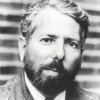Stanley Milgram

Stanley Milgram
Stanley Milgramwas an American social psychologist, best known for his controversial experiment on obedience conducted in the 1960s during his professorship at Yale. Milgram was influenced by the events of the Holocaust, especially the trial of Adolf Eichmann, in developing the experiment...
NationalityAmerican
ProfessionPsychologist
Date of Birth15 August 1933
CountryUnited States of America
aggression anger behavior break execution given key lies nature relationship subjects themselves unable
The key to the behavior of subjects lies not in pent-up anger or aggression, but in the nature of their relationship to authority. They have given themselves to the authority; they see themselves as instruments for the execution of his wishes; once so defined, they are unable to break free.
authority compared induced laboratory light national produced profound slumber state system
The state produced in the laboratory may be likened to a light doze, compared to the profound slumber induced by the preponent authority system of a national government.
actions authority callous demands good knuckle numbing people perform seen
With numbing regularity, good people were seen to knuckle under the demands of authority and perform actions that were callous and severe,
concentration camps concentration-camp
Even Eichmann was sickened when he toured the concentration camps...
men dwelling isolation
Some system of authority is a requirement of all communal living, and it is only the man dwelling in isolation who is not forced to respond, through defiance or submission, to the commands of others.
social-behavior action realizing
Only in action can you fully realize the forces operative in social behavior. That is why I am an experimentalist.
survival culture action
But the culture has failed, almost entirely, in inculcating internal controls on actions that have their origin in authority. For this reason, the latter constitutes a far greater danger to human survival.
men mutual-support wish
When an individual wishes to stand in opposition to authority, he does best to find support for his position from others in his group. The mutual support provided by men for each other is the strongest bulwark we have against the excesses of authority.
self action behavior
For a person to feel responsible for his actions, he must sense that the behavior has flowed from the self.
powerful men views
I started with the belief that every person who came to the laboratory was free to accept or to reject the dictates of authority. This view sustains a conception of human dignity insofar as it sees in each man a capacity for choosing his own behavior. And as it turned out, many subjects did, indeed, choose to reject the experimenter's commands, providing a powerful affirmation of human ideals.
patriotic soldier patriotism
The soldier does not wish to appear a coward, disloyal, or un-American. The situation has been so defined that he can see himself as patriotic, courageous, and manly only through compliance.
men political purpose
Obedience is the psychological mechanism that links individual action to political purpose. It is the dispositional cement that binds men to systems of authority.
puppets firsts steps
And perhaps our awareness is the first step to our liberation.
giving political challenges
Perhaps the challenge is to invent the political structure that will give conscience a better chance against authority.